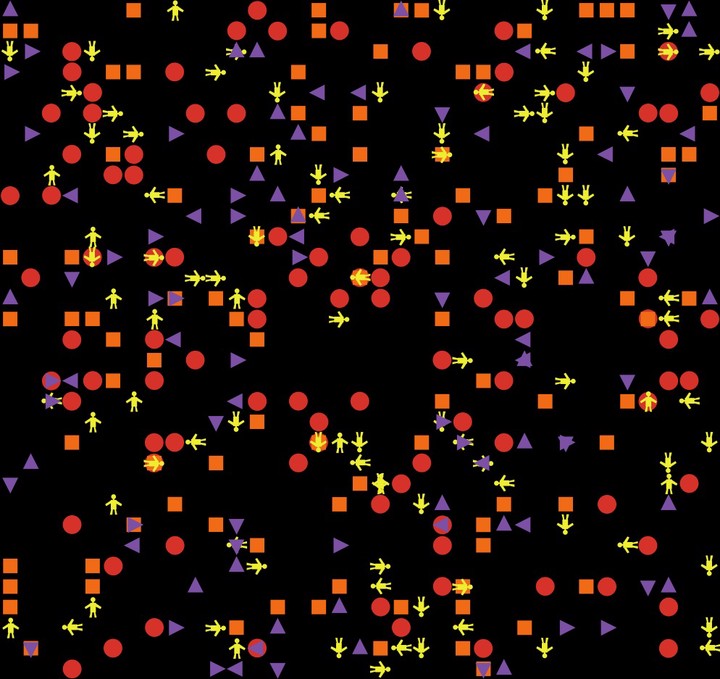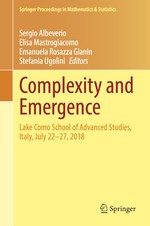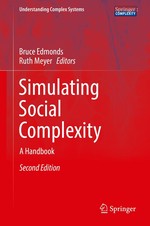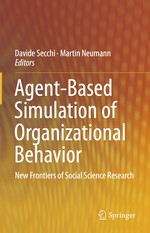 Simulation of the Garbage Can Model
Simulation of the Garbage Can ModelStill to be written
Raffaello Seri
Professor of Econometrics
My research interests include statistics, numerical analysis, operations research, psychology, economics and management.
Related
Publications
Randomness, Emergence and Causation: A Historical Perspective of Simulation in the Social Sciences
This chapter is a review of some simulation models, with special reference to social sciences. Three critical aspects are identified–i.e. randomness, emergence and causation–that may help understand the evolution and the main characteristics of these simulation models. Several examples illustrate the concepts of the paper.
Asymptotic Properties of the Plug-in Estimator of the Discrete Entropy under Dependence
We consider the estimation of the entropy of a discretely-supported time series through a plug-in estimator. We provide a correction of the bias and we study the asymptotic properties of the estimator. We show that the widely-used correction proposed by Roulston (1999) is incorrect as it does not remove the $O\left(N^{-1}\right)$ part of the bias while ours does. We provide the asymptotic distribution and we show that it differs when the values taken by the marginal distribution of the process are equiprobable (a situation that we call degeneracy) and when they are not. We introduce estimators of the bias, the variance and the distribution under degeneracy and we study the estimation error. Finally, we propose a goodness-of-fit test based on entropy and give two motivations for it. The theoretical results are supported by specific numerical examples.
Model Calibration and Validation via Confidence Sets
The issues of calibrating and validating a theoretical model are considered, when it is required to select the parameters that better approximate the data among a finite number of alternatives. Based on a user-defined loss function, Model Confidence Sets are proposed as a tool to restrict the number of plausible alternatives, and measure the uncertainty associated to the preferred model. Furthermore, an asymptotically exact logarithmic approximation of the probability of choosing a model via a multivariate rate function is suggested. A simple numerical procedure is outlined for the computation of the latter and it is shown that the procedure yields results consistent with Model Confidence Sets. The illustration and implementation of the proposed approach is showcased in a model of inquisitiveness in ad hoc teams, relevant for bounded rationality and organizational research.
Controlling for False Negatives in Agent-Based Models: A Review of Power Analysis in Organizational Research
This article is concerned with the study of statistical power in agent-based modeling (ABM). After an overview of classic statistics theory on how to interpret Type-II error (whose occurrence is also referred to as a false negative) and power, the manuscript presents a study on ABM simulation articles published in management journals and other outlets likely to publish management and organizational research. Findings show that most studies are underpowered, with some being overpowered. After discussing the risks of under- and overpower, we present two formulas to approximate the number of simulation runs to reach an appropriate level of power. The study concludes with the importance for organizational behavior scholars to perform their models in an attempt to reach a power of 0.95 or higher at the 0.01 significance level.
How many times should one run a computational simulation?
This chapter is an attempt to answer the question “how many runs of a computational simulation should one do,” and it gives an answer by means of statistical analysis. After defining the nature of the problem and which types of simulation are mostly affected by it, the chapter introduces statistical power analysis as a way to determine the appropriate number of runs. Two examples are then produced using results from an agent-based model. The reader is then guided through the application of this statistical technique and exposed to its limits and potentials.
Analytical Approaches to Agent-Based Models
The aim of this article is to present an approach to the analysis of simple systems composed of a large number of units in interaction. Suppose to have a large number of agents belonging to a finite number of different groups: as the agents randomly interact with each other, they move from a group to another as a result of the interaction. The object of interest is the stochastic process describing the number of agents in each group. As this is generally intractable, it has been proposed in the literature to approximate it in several ways. We review these approximations and we illustrate them with reference to a version of the epidemic model. The tools presented in the paper should be considered as a complement rather than as a substitute of the classical analysis of ABMs through simulation.
Talks
Estimation of DSGE models by non-Gaussian Vector Autoregressions
International conference
Aug 26, 2024 — Aug 30, 2024
Rotterdam, The Netherlands
Estimation of DSGE models by non-Gaussian Vector Autoregressions
International conference
Jun 25, 2024 — Jun 27, 2024
Thessaloniki, Greece
Generalized Optimization Algorithms for Complex Models
International conference
Jun 25, 2024 — Jun 27, 2024
Thessaloniki, Greece
Estimation of DSGE models by non-Gaussian Vector Autoregressions
International conference
May 20, 2024 — May 22, 2024
London, United Kingdom
Data-driven Identification and Estimation of DSGE Models by Non-Gaussianity
International conference
Dec 16, 2023 — Dec 18, 2023
Berlin, Germany
Model Trustworthiness and Modeler Responsibility in Economic Agent-Based Modeling practices: a Meta-Analytical approach
International conference
Nov 30, 2023 — Dec 1, 2023
Stuttgart, Germany
Generalized Optimization Algorithms for $M$-Estimation of Complex Simulation Models
International conference
Aug 20, 2023 — Aug 25, 2023
Tokyo, Japan
Understanding the analogical roots of Agent-Based Models in economics and social sciences
International conference
Jul 3, 2023 — Jul 5, 2023
Prague, Czech Republic
Data-driven identification and estimation of DSGE models with non-Gaussian data
May 26, 2023 12:00 AM — May 28, 2023 12:00 AM
Cagliari, Italy
Understanding the analogical roots of Agent-Based Models in economics and social sciences
International conference
May 24, 2023 — May 26, 2023
Venezia, Italy
Model selection by minimum-distance index with non-Gaussian data
Seminar
Feb 22, 2023
Helsinki, Finland
Nonparametric moment-based estimation of simulated models via regularized regression
International conference
Dec 17, 2022 — Dec 19, 2022
London, United Kingdom
Generalized $M$-estimation for Complex Simulation Models
International conference
Sep 25, 2022 — Sep 27, 2022
Pisa, Italy
Circumventing Violations of Stochastic Equicontinuity in $M$-estimation
Jan 20, 2022 12:00 AM — Jan 21, 2022 12:00 AM
Rimini, Italy
Nonparametric Moment-based Estimation of Simulated Models via Regularized Regression
International conference
Aug 24, 2021 — Aug 27, 2021
Copenhagen, Denmark (online)
Asymptotic properties of the plug-in estimator of the discrete entropy under dependence
Seminar
Feb 9, 2021
Pisa, Italy (online)
Nonparametric moment-based estimation of simulated models without optimization
International conference
Dec 19, 2020 — Dec 21, 2020
London, United Kingdom (online)
Analyzing the gender pay gap with Agent-Based Modeling
International conference
Dec 4, 2020 — Dec 6, 2020
Dublin, Ireland (online)
Nonparametric moment-based estimation of simulated models via regularized regression
International conference
Sep 14, 2020 — Sep 18, 2020
Milano, Italy (online)
A complex adaptive approach to the gender pay gap
International conference
Jul 2, 2020 — Jul 4, 2020
Hamburg, Germany (online)
Calibration of Agent-Based simulation Models via Model Confidence Sets
Seminar
Jun 9, 2020
Varese, Italy (online)
Counterfactual evaluation in history-friendly models: limits and perspectives
Jan 17, 2020 2:00 PM — 2:30 PM
Ispra, Italy
Model calibration and validation via confidence sets
International conference
Dec 14, 2019 — Dec 16, 2019
London, United Kingdom
Spot the differences! The Simulated Minimum-Distance Method
International conference
Jun 26, 2019 — Jun 28, 2019
Lisbon, Portugal
A simulated minimum-distance method for the calibration of ABMs
International conference
Jun 3, 2019 — Jun 6, 2019
Brighton, United Kingdom
A simulated minimum-distance method for the calibration of ABMs
International conference
May 3, 2019 — May 4, 2019
Bolzano, Italy
A minimum-distance estimator for the calibration of simulation models
International conference
Dec 14, 2018 — Dec 16, 2018
Pisa, Italy
Emergence and Causation in Simulation Models in Social Sciences
Guest lecture
Jul 23, 2018 — Jul 24, 2018
Como, Italy
A power primer for Agent-Based simulation Models. Determining the number of runs in linear and polynomial regressions
International conference
Jun 20, 2018 — Jun 23, 2018
Reykjavík, Iceland
When Finding Appropriate Parameter Values is Challenging: Response Surface Methodology
International conference
Jan 25, 2018 — Jan 26, 2018
Huddersfield, United Kingdom
Controlling for 'false negatives' in agent-based models of organizational behavior: A review of power analysis
International conference
Jun 17, 2015 — Jun 20, 2015
Warsaw, Poland
An approach to tax evasion with social peers and reference dependent preferences
International conference
May 7, 2015 — May 8, 2015
Slagelse, Denmark
Analytical approaches to the analysis of agent-based models
International conference
Jan 27, 2014 — Jan 28, 2014
Bournemouth, United Kingdom


